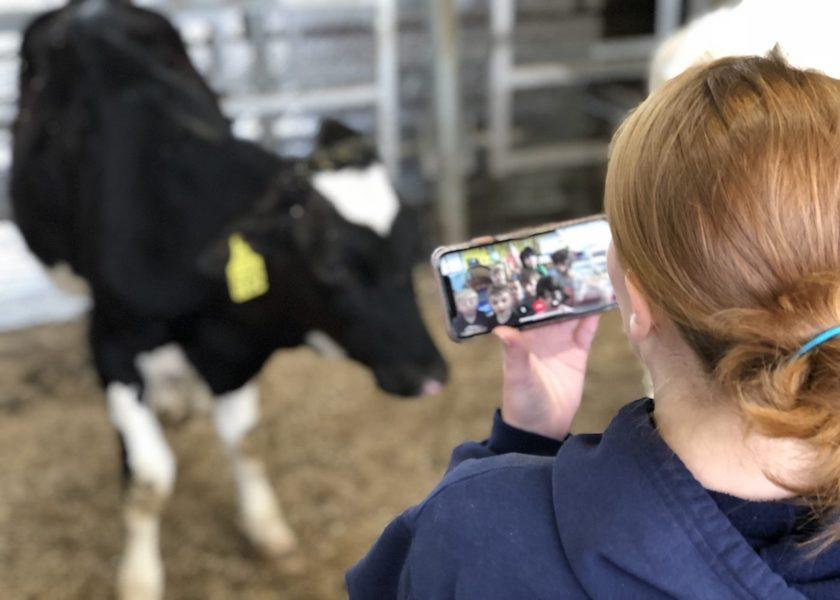'Adopt a Cow' Program Brings Agriculture to the Classroom, Registration Closes Sept. 15

Discover Dairy’s “Adopt a Cow” program opened for enrollment for the 2023-24 school year on May 1 and closes on September 15. The free program, which impacted 1.2 million students worldwide last year, is a year-long, interactive learning opportunity that gives students an inside look at a dairy farm in the United States. Students participate in hands-on, educational activities featuring the calves on the farm and the dairy farmers who manage the operation. Individuals who are passionate about the dairy and agriculture industries can spread the word about the free program with families in their community. Email Brittany Snyder at bsnyder@centerfordairyexcellence.org, or call 717-346-0849, to request postcards or other material to share with individuals in your community.
Each classroom that enrolls in the Adopt a Cow program is paired with a calf from a dairy farm. Teachers and students receive photos, video updates, and activity sheets throughout the school year that allow them to watch their calf grow. Through immersive, hands-on learning activities and free curriculum provided by Discover Dairy, students gain a deeper understanding of the dairy industry and where their food comes from. Several of the lessons in the curriculum follow Common CORE standards in Math, Reading, and Science.
“The Adopt a Cow program continues to grow every year, and we love seeing the impact it’s making on students, classrooms and families across the globe,” said Brittany Snyder, Dairy Education Program Manager at the Dairy Excellence Foundation. “Students are building so many meaningful connections through this program, and we appreciate our partners’ support and the entire dairy industry for spreading the word. Encourage a teacher or parent you know to sign up by September 15th to join the fun this school year.”
The program helps teachers create a wide range of connections with their curriculum and community at large:
- Dairy nutrition and community connections. “I would encourage other teachers to take advantage of all the Adopt a Cow resources, because it’s free to us as teachers. The program makes such great connections. Students learn to appreciate where their food comes from and are able to put a ‘face’ to the milk at the grocery store. It’s giving kids those opportunities to connect what they’re learning in school to what’s actually going on in the community.” – Anna Breitbach, a first-grade teacher in South Florida
- Environmental and sustainability connections. “Students can definitely relate to the fact that water is so important and food is so important to taking care of cows. The farmer who is taking care of the cows is also important. The Adopt a Cow program really sets a solid foundation for all that it takes to care for these animals. I talk to the kids a lot about how we share the air that we breathe and how that’s important for cows, too. They need fresh, clean air and places to roam. I think they’re really getting the bigger picture.” – Jayne Black, a pre-school teacher from De Pere, Wisconsin
- Spanish and language connections. “I had a Spanish-speaking student who didn't know English. He came from Mexico, and when we started the Adopt a Cow program, we started doing vocabulary. He was so excited because he had cows on his land in Mexico. Using an app, he was able to communicate with the rest of the group and tell them what he knew about cows. It helped him open up and build his English language skills and his self-confidence. He felt part of the group and was respected by other kids who would ask him questions about cows.” – A previous Adopt a Cow participant
- Geography and environmental connections. “Within our agriculture unit, my students study maps and discuss the spatial pattern of dairy cows located within the United States as well as maps of the distribution of dairy farms within our home state of Tennessee. I was hoping to use the Discover Dairy and Adopt a Cow materials to help teach this unit, which is often a difficult one for my students to grasp. I also believed adopting a calf would bring a measure of light-heartedness to a challenging course. My freshmen have loved the experience! They enjoy viewing the updates as the calves matured.” –Lori Napier, a high school human geography teacher in Tennessee
- Writing connections. “When each student had their calf Violet to ‘babysit for a day,’ they wrote about what she did in the journal and loved drawing pictures of her. Since sharing your ideas by drawing and writing is a first-grade skill, it was the perfect way for them to have a real reason to write, which is highly motivating for first graders — especially those who have not done much writing before first grade.” –Kelly Collingsworth, elementary teacher from Camp Hill, Pennsylvania
The Adopt a Cow program also offers live virtual chats and farm tours. These chats allow students to talk directly with a dairy farmer, meet their calves, tour the farm, and ask questions about milk production.
Last year, more than 40,000 elementary and middle school classrooms, home school families, library groups, and other organizations participated in the program. Classrooms from all 50 states participated in the program along with a total of 50 countries. Schools from both rural and urban areas can enroll, bringing dairy farming to life for students of all ages and demographics.
Teachers who enroll in the Adopt a Cow program will receive an introductory update in the fall with details about their calf. Classrooms will receive bi-monthly updates, including suggestions on components of the Discover Dairy curriculum that teachers can incorporate into their virtual or in-person lesson plans.
The sign-up period closes on September 15, 2023. To enroll in the free Adopt a Cow program, visit www.discoverdairy.com/adopt or contact the Dairy Excellence Foundation at 717-346-0849 for more information about how to share this program with your community.







